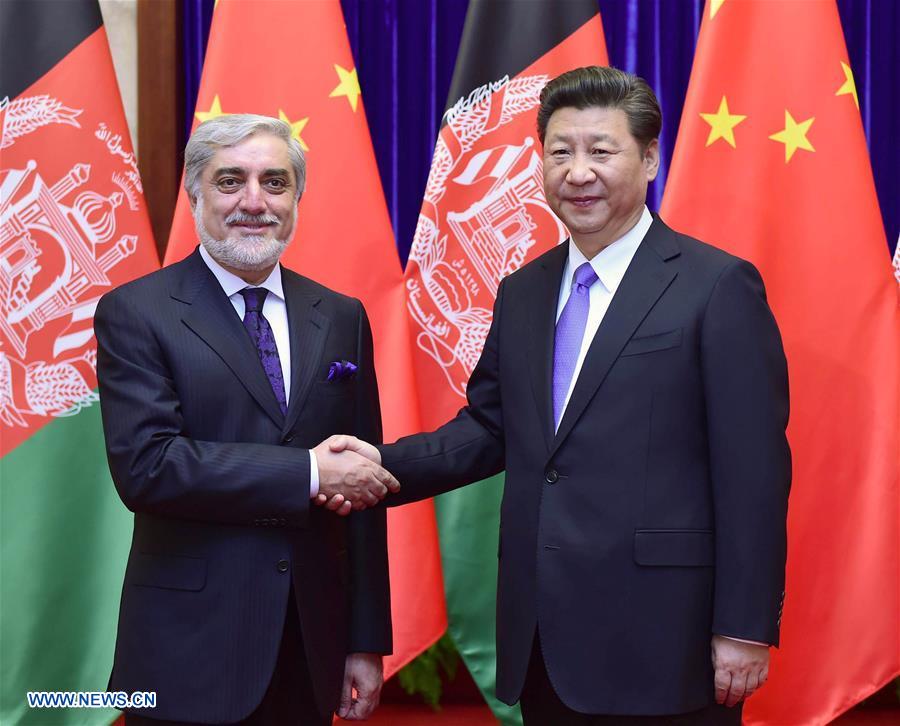China's role in the Afghan peace process: factors for success
- By Mohsen Shariatinia & Ehsan Razani
 0 Comment(s)
0 Comment(s) Print
Print E-mail China.org.cn, May 18, 2016
E-mail China.org.cn, May 18, 2016
|
|
| Chinese President Xi Jinping (R) meets with visiting Afghan Chief Executive Abdullah Abdullah in Beijing, capital of China, May 17, 2016. (Xinhua/Zhang Duo) |
These days, of all the other world leaders, Xi Jinping is the one who receives the most invitations to play a part in various international issues. China's low-profile diplomacy has been the subject of much debate within the past few years. Some critiques have blamed China for getting free rides, while others, especially those from the developing world, have insisted on China's ever increasing proactive international involvement.
It seems as if Xi Jinping has been, more so than ever before, demonstrating his willingness to respond positively to such invitations. Since the time he took office, Chinese involvement in international relations has clearly been expanding. One of these arenas, within which China has been playing a part, is the Afghan conflict. This begs the question: Which elements can be determinants in the success of China's latest partaking in Afghanistan?
The first contributing factor would be complexity of the crisis in Afghanistan. This crisis is at very crossroads of conflicting interests for many transnational groups and regional and global powers. Unsuccessful attempts by various actors at producing solutions and closure in the past couple of decades are due to this factor. Therefore, this crisis is known for bringing fresh sets of innuendos to any actor who dares to wander deep inside it. The crisis in Afghanistan deeply differs from other international conflicts, which are often ephemeral and quickly resolved. As a result, this is a crisis that needs to be placed next to the Palestinian crisis, which also has a history of being irresoluble. Considering such factors, one can say that China is going up against one of the most complex international crises.
The second contributing factor goes back to the unsuccessful attempts made by world powers in this crisis. Both the Soviet Union and the United States, as the two emerging superpowers in the post-Second World War world, have, within a certain period, spent much of their strategic will on obtaining their own desired forms of peace in this country – and have both failed. Therefore, it is safe to consider Afghanistan a crisis for which the largest amount of international power resources, within the past few decades, has been spent towards resolve and resolution. It is interesting to note that both superpowers, at the beginning of their role implementation, sincerely believed they would return stability and peace to this country. China is the third great power to try its luck at resolving the crisis.
The Third contributing factor depends on Chinese interaction with America on the crisis. It is clear that strategic competition between China and America has escalated over the past few years. It won't be easy to give shape to a win-win game between the two countries in the complex crisis of Afghanistan. However, both countries do have a history of playing such games in other international crises, the last and most recent of which was their close cooperation on and implementation of a strategy to resolve the Iranian nuclear crisis. If these two actors can repeat the same successful model in advancing the peace process in Afghanistan, they can take an important step towards solving this crisis.
The forth contributing factor goes back to China's ability to influence Pakistan's role in the crisis. In recent months, many arguments have been raised over the issue of China's capability to alter Pakistan's strategic behavior. Fundamentally, one of the reasons behind the enthusiasm of Ashraf Ghani's government towards the ever expanding role of China in this crisis is the belief that China has the power to affect Pakistan's foreign behavior. In the new period, which resulted in the ever-increasing roles of regional players in the Afghan crisis, Pakistan has, once again, turned into the most important player in the crisis. For this reason, China's ability to have an impact on Pakistan's behavior towards the crisis in Afghanistan can be considered as the most influential factor for the success or failure of China's Afghan strategy.
Finally, the fifth contributing factor can be the way that other players like Russia, Iran, and India see the Chinese-centered peace plan in Afghanistan. Despite the fact that these countries have, more or less, been involved in the shaping of political process in Afghanistan, they have appeared unwilling to play a part in the new peace process. What these countries think about this procurement and the role China plays in it can have an impact on the outcome of negotiations.
Mohsen Shariatinia is an assistant professor of international relations at the Institute for Regional Studies, Shahid Beheshti University, Tehran.
Ehsan Razani is member of the School of Law and Politics, Islamic Azad University, Shahrood, Iran.
Opinion articles reflect the views of their authors, not necessarily those of China.org.cn.







Go to Forum >>0 Comment(s)